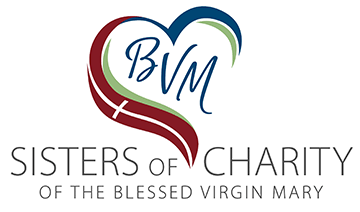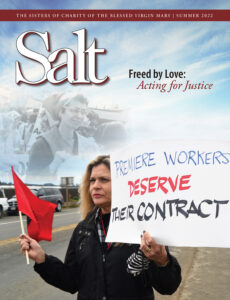Ministry Partnership Grant: National Farm Workers Harvesting a Long-term BVM Relationship
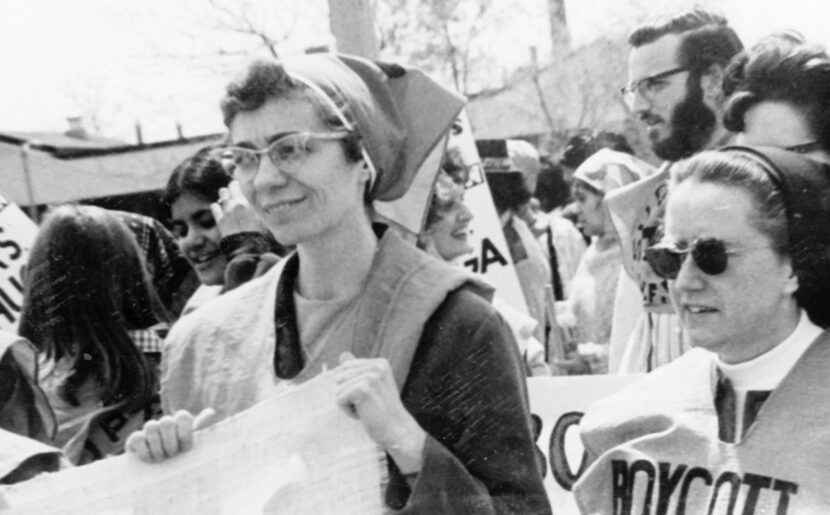
Carol Frances Jegen, BVM attends a protest in support of farm workers in 1973.
In a letter from the Fresno County jail, Carol Frances wrote, “This experience is one of the most beautiful and meaningful in my life . . . Never before have I realized in quite the same way I do now what power we have as Sisters . . . what our very presence means to the workers in the courts, etc., it’s inestimable.”
In 1975, Carol Frances continued to advocate, writing, “From one point of view, migrant ministry is not new to BVMs, if one considers our first beginnings in the context of serving Irish immigrants who had migrated to a strange country and needed the support of their church as never before.” A year later, the BVM Senate voted unanimously to join NFWM. Since then, BVMs have been actively involved, with several serving on the NFWM board.
Did you know that almost 85% of our fruits and vegetables are harvested by hand in America? Our orchards, fields, nurseries, dairies, and feed lots would not be properly cared for and harvested without the nearly two million farm workers that labor the long, grueling hours it takes to ensure the multi-billion-dollar U.S. agriculture industry survives.
Their reward? Low wages, heat stress, pesticide exposure, and the mental anguish of knowing that they can grow the food, but they can’t afford to eat it. Farm workers are often not protected by the laws that protect other workers. Instead, they rely on the help and support of consumers, advocates, and people of faith.
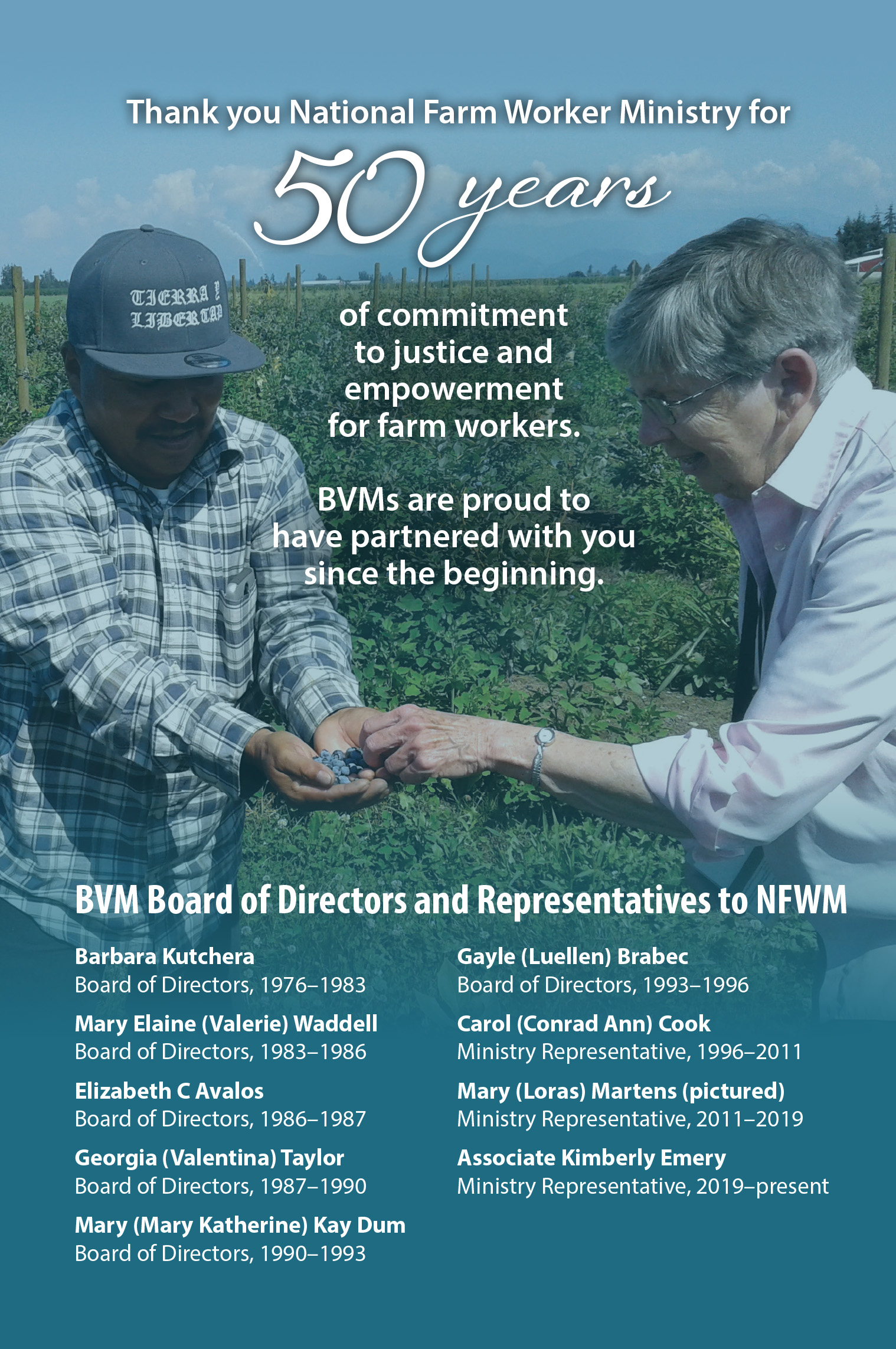
Sowing Seeds
Since the beginning, the Sisters of Charity, BVM have been supporters of the essential work of the National Farm Workers Ministry (NFWM) and have stood in solidarity with farm workers. BVM Representative to NFWM, Associate Kimberly Emery believes that farm workers are “some of the poorest, most exploited, and marginalized individuals in our country.”
While serving as the BVM representative, Kimberly has witnessed and participated in NFWM’s advocacy efforts to support farm workers in their struggle for justice. She says, “While the NFWM is a small non-profit, its heart is big, its voice is loud, and its faith is strong.”
For Kimberly, what is most inspiring of all is the hope, commitment, and faith of our farm worker brothers and sisters who engage daily in the struggle for justice and better working conditions.
NFWM works with partner organizations such as the United Farm Workers, the Catholic Labor Network, the Coalition of Immokalee Workers, and the Farm Organizing Committee. Through its support of farm worker-led boycotts (for example, against Wendy’s and Reynolds Tobacco), legislative campaigns, and advocacy efforts, they work diligently to curb grower and corporation abuses and protect workers’ health and safety in the fields.
Growing Together
In her BVM Ministry Partner Grant referral, Kimberly writes, “NFWM’s mission embodies the Vision and Values Statement of Sisters of Charity, BVM. NFWM has been a significant BVM ministry . . . committed to farm workers ‘enjoying freedom in God’s steadfast love’ by listening deeply to this traditionally silenced and marginalized group and by being in solidarity with them in their ongoing struggle.”
As NFWM celebrates its 50th anniversary, they remain steadfast in their efforts to educate, equip, and mobilize supporting organizations, faith communities, and individuals to support farm worker-led campaigns aimed at improving working and living conditions. They persist in developing a new generation of justice seekers through education, internships, and expanded opportunities for involvement.
“We are grateful for the support of the Sisters of Charity of the Blessed Virgin Mary. We have come to rely on the BVMs for presence at our board meetings and public witness opportunities,” says NFWM Executive Director Julie Taylor.
“They have given generously to our organization so we can educate, equip, and mobilize people of faith and conscience in the farm worker movement over the years.” Julie explains that through these gifts, NFWM has been able to provide solidarity with farm workers and to support their campaigns.
“BVMs are an integral part of NFWM’s work to amplify the voices of farm workers and we look forward to even more opportunities to partner with them.”
About the author: Kari Litscher is a communications specialist for the Sisters of Charity, BVM in Dubuque, Iowa.
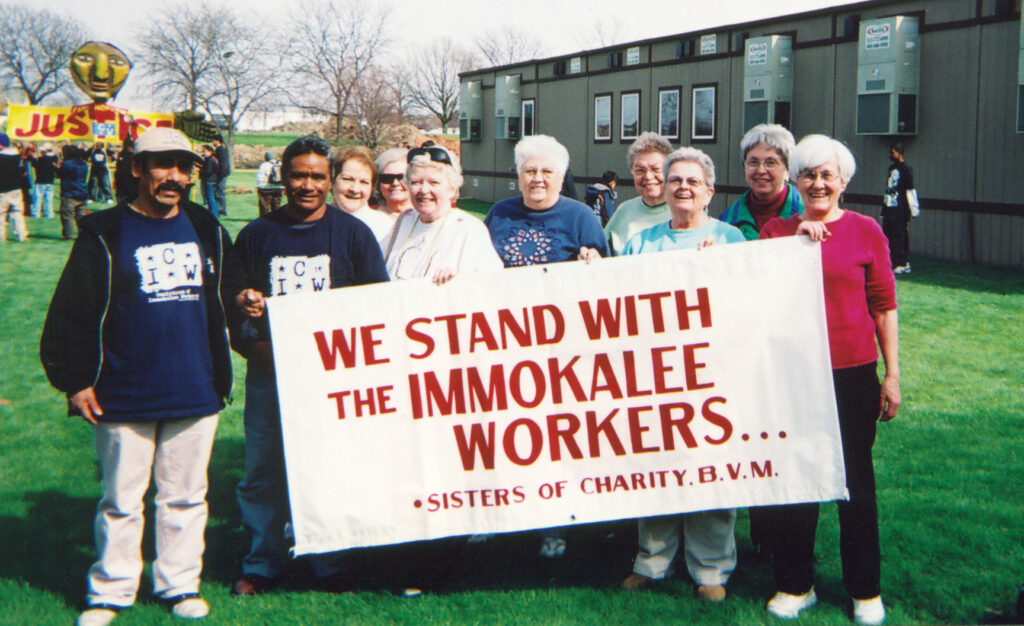
SUMMER 2022: Freed by Love: Acting for Justice
In this issue of Salt, we share how the BVMs continue to fight for causes at the Heart of BVM, such as access to affordable healthcare, protecting whistleblowers, leaving behind a healthy planet, and fighting for justice with the National Farm Worker Ministry (NFWM).
If you would like to receive Salt, contact the Office of Development for a complimentary subscription at development@bvmsisters.org or 563-585-2864.
